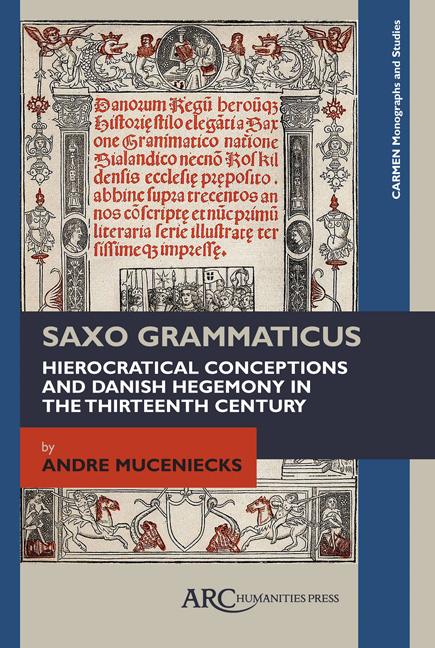Book contents
- Frontmatter
- Contents
- List of Illustrations
- Acknowledgements
- Foreword
- Preface
- Chapter 1 Denmark and the Baltic in the Thirteenth Century
- Chapter 2 The Work
- Chapter 3 Political Conceptions
- Chapter 4 Euhemerism and the East in Saxo Grammaticus
- Chapter 5 Virtues and Values in Saxo Grammaticus: The Four Cardinal Virtues
- Chapter 6 The Thematic of the Counsellor
- Conclusion
- Appendix 1 List of the Kings in Books I–VIII of the Gesta Danorum
- Appendix 2 Rulers and Archbishops of Denmark in Relation to Events in the Baltic, the Empire, and the Papacy
- Appendix 3 Genealogy of the Valdemarian Kings
- Bibliography
- Index of Persons
- Index of Places and Peoples
- Index of Authors and Primary Sources
- Index of Subjects
Chapter 6 - The Thematic of the Counsellor
Published online by Cambridge University Press: 15 January 2021
- Frontmatter
- Contents
- List of Illustrations
- Acknowledgements
- Foreword
- Preface
- Chapter 1 Denmark and the Baltic in the Thirteenth Century
- Chapter 2 The Work
- Chapter 3 Political Conceptions
- Chapter 4 Euhemerism and the East in Saxo Grammaticus
- Chapter 5 Virtues and Values in Saxo Grammaticus: The Four Cardinal Virtues
- Chapter 6 The Thematic of the Counsellor
- Conclusion
- Appendix 1 List of the Kings in Books I–VIII of the Gesta Danorum
- Appendix 2 Rulers and Archbishops of Denmark in Relation to Events in the Baltic, the Empire, and the Papacy
- Appendix 3 Genealogy of the Valdemarian Kings
- Bibliography
- Index of Persons
- Index of Places and Peoples
- Index of Authors and Primary Sources
- Index of Subjects
Summary
UP TO NOW, the basic order of values in the Gesta Danorum particularly the focus on schemes of virtues, has been reviewed as already argued by Kurt Johannesson. In the four first books, Saxo Grammaticus delivered several exempla and even allegories of virtues, gradually presenting them, following the methodology to highlight one virtue at the time.
The section between books V and VIII is organized in a different manner. The common use of two or more minor plots, almost independent of each other, is replaced by the focus on central characters with broader perspectives. The method was used in some way in book I when dealing with Hadingus's career, even though the book presented at the beginning a few minor plots.
The common use of judgemental and explanatory sentences underwent some changes. In the previous books the most part of exempla of virtues were used in such a way that the sententiae corroborate the narrative; from book V onwards there is a stronger focus on the narrative itself. There are still many sententiae, but their discourse mainly refers to accessory elements of the plot, sometimes displaced from the main theme, not anymore proffered as summarizing it.
An example of this use can be found in book V when Saxo describes the degenerate situation in the first phase of Frotho III's court; there are many statements about women and marriage between members of the same social strata, but few clear declarations about the main thematic in the narrative—the dependence of the king on his advisors and counsellors.
Book V deals in its entirety with the tale of King Frotho III and the hero Ericus disertus. Their stories are not two consecutive narratives about separate characters, but one single plot elaborated in a complex manner. Book VI delivers the intricate story of Starcatherus, which will be extended until book VIII, although with less strength and vitality. That book begins with minor plots, necessary in order to make a connection between the current stories and the previous one; finally, these books present a particular focus on selected characters.
This centrality on single characters derives from the manner in which the virtues were introduced until then. In the previous books were developed characters provided with one or more virtues, but not endowed with all of them.
- Type
- Chapter
- Information
- Saxo GrammaticusHierocratical Conceptions and Danish Hegemony in the Thirteenth Century, pp. 105 - 174Publisher: Amsterdam University PressPrint publication year: 2017



